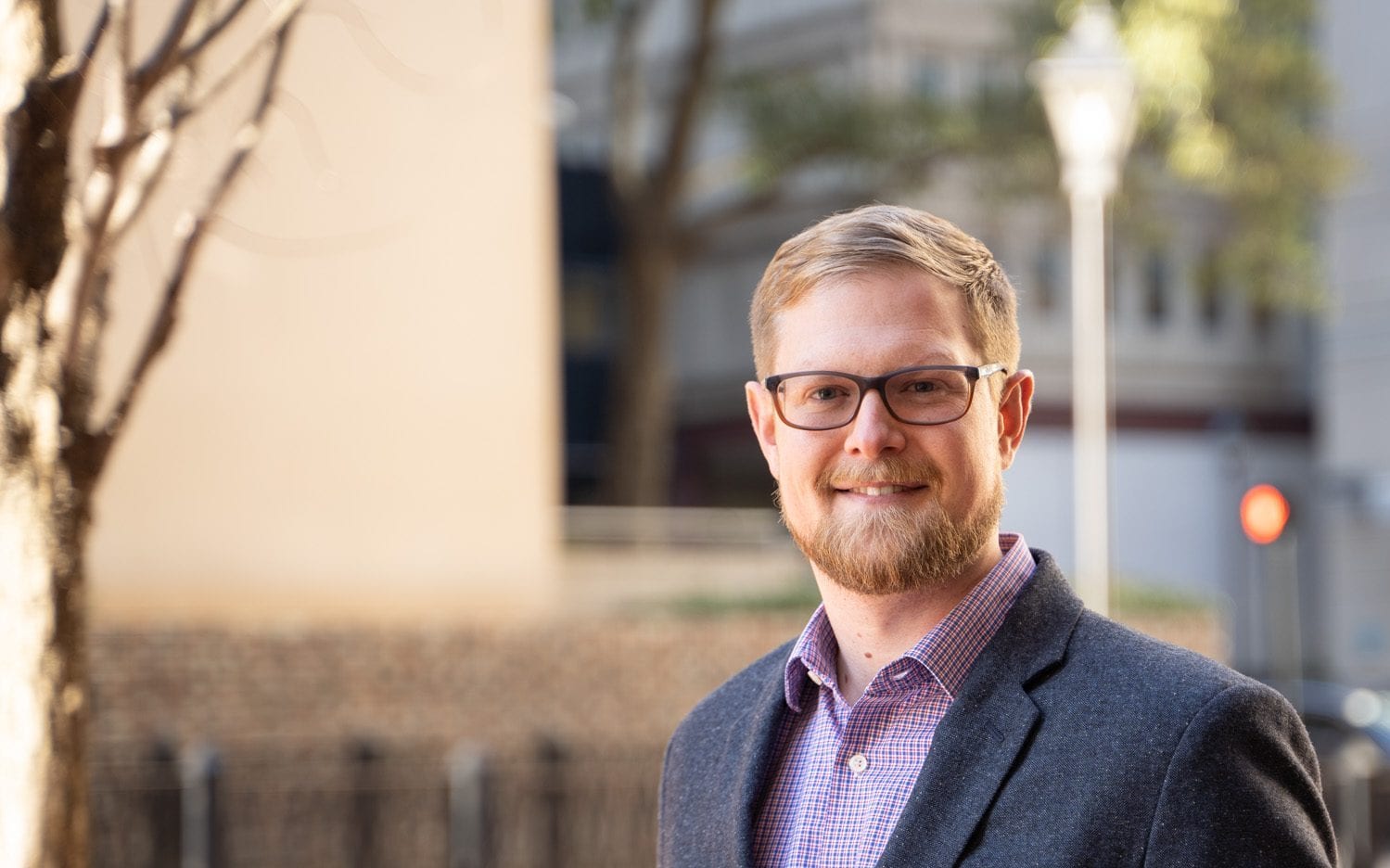‘This is my heart’

By Erica Naone
The first time Harold Barnwell, D.N.A.P., CRNA (M.S.N.A.’14/HP; D.N.A.P.’15/HP), encountered a nurse anesthetist, it changed the course of his life. He’d planned to become an attorney, but while exploring career options during the summer after his freshman year at Liberty University in Lynchburg, Virginia, Barnwell visited a rural hospital near his family’s home in Georgia.
Nurse anesthetists, nurses with critical care experience who are also licensed to provide anesthesia, often work in teams with physician anesthesiologists. But at this rural hospital, the nurse anesthetist was the only anesthesia provider. Barnwell watched in awe and fascination.
“He was knowledgeable and compassionate and that was combined with his ability to communicate with everyone in the room and direct what was going on,” Barnwell says. “He had an understanding of the drugs he was giving, and there was also a technology component. … I thought, this is everything in one job.”
In particular, he admired the way the nurse anesthetist worked with people. “You could see [patients] being nervous and anxious when they walked in, like I would be for surgery,” Barnwell says. “And then you could see them smile and laugh as they’d go back to the operating room. In five minutes, he completely changed the feel of this room.”
Barnwell began working nights in the hospital’s ER as a patient care tech for the summer, partly to get more opportunities to work with the nurse anesthetist. When the fall semester started, he changed his major from communications to nursing. He went on to earn two degrees from Virginia Commonwealth University’s Department of Nurse Anesthesia in the College of Health Professions. Now, Barnwell has become the person people describe as knowledgeable and compassionate, well-versed in the technology he uses and able to positively affect the people around him.
“He is a really good person, very passionate about all of his research work and very cooperative as a collaborator,” says Jiale “Gary” Hu, a Ph.D. student at the University of Ottawa and adjunct faculty member in VCU’s Department of Nurse Anesthesia who has been friends with Barnwell since they met at VCU in 2013 while Hu was a visiting international scholar.
Today, Barnwell works as an assistant professor and assistant director of doctoral education in VCU’s Department of Nurse Anesthesia and is a practicing anesthetist at VCU Health. He is particularly interested in improving education for millennial students.
He believes that technological advances allow for more engaging educational techniques than are possible with traditional textbooks and lectures. Barnwell, who considers himself a part of the millennial generation, thought it was important to bring educational content to tablets and mobile devices and began to create short videos, inspired by the Khan Academy, a popular free educational website. “I’m looking out there saying, ‘What’s working? What are people engaging with?’ There are millions of people watching videos online. Can we tap into that?”
By breaking lecture content into bite-sized pieces that students can study at their convenience, Barnwell frees up class time for more complex interactions where his presence can truly make a difference.
Z. Bakhtiar, a student in the College of Health Professions working toward a doctorate in nurse anesthesia practice, has taken several courses with Barnwell and is enthusiastic about Barnwell’s techniques. “I think that these videos work really well for students because these are the kinds of resources that we are using independently to supplement our learning. Now it’s coming from the source,” he says.

Barnwell’s emphasis on technology goes hand-in-hand with a personal, involved approach to education. “He’s a really nice guy who takes a lot of time to get to know his students,” Bakhtiar says.
Barnwell’s teaching concepts reach beyond the classroom. He’s collaborating with Hu to create a series of modules on pain management that would be distributed through Chinese social media to health care professionals in that country. The work is funded by a grant from the International Association for the Study of Pain.
He is also pursuing a Ph.D. in Health-Related Sciences in the College of Health Professions. With the original research skills he will gain from that program, Barnwell hopes to enhance his clinical practice by studying applications of ultrasound for anesthesia and to design studies that can determine how effective his educational ideas are for students.
“It’s hard to find educators who have a foot in both the clinical arena and in the academic arena,” says Michael D. Fallacaro, D.N.S., CRNA, FAAN, former chair of the Department of Nurse Anesthesia in the VCU College of Health Professions. Barnwell, he adds, “is able to bring that clinical expertise into the classroom and vice versa in an innovative and highly energized way.”
Barnwell says his emphasis on technology comes from his desire to find more time for the human element in all interactions. “If I can find more efficient ways for students to learn the material, then they have more time with their family. If I find more efficient ways for system processes to happen in an operating room, then we get more time for that clinician and that patient,” he says.
While many clinicians get into health care to take care of others in a time of need, Barnwell says, too often the grueling day-to-day aspects of working within limited time and resources can leave them struggling to maintain that purpose, especially when they are under pressure to meet productivity and speed expectations.
“This is my heart, what really underpins why I do these things,” he says. “I dream of caring for my students in the classroom and modeling for them the sort of engagement and interaction and care that I want them to then carry out into the clinical setting. I think if enough of us do this in schools across the country in multiple disciplines, then in a generation, you change the ethos in health care back to a truly patient-centered, individual-centered model.”
Categories Alumni